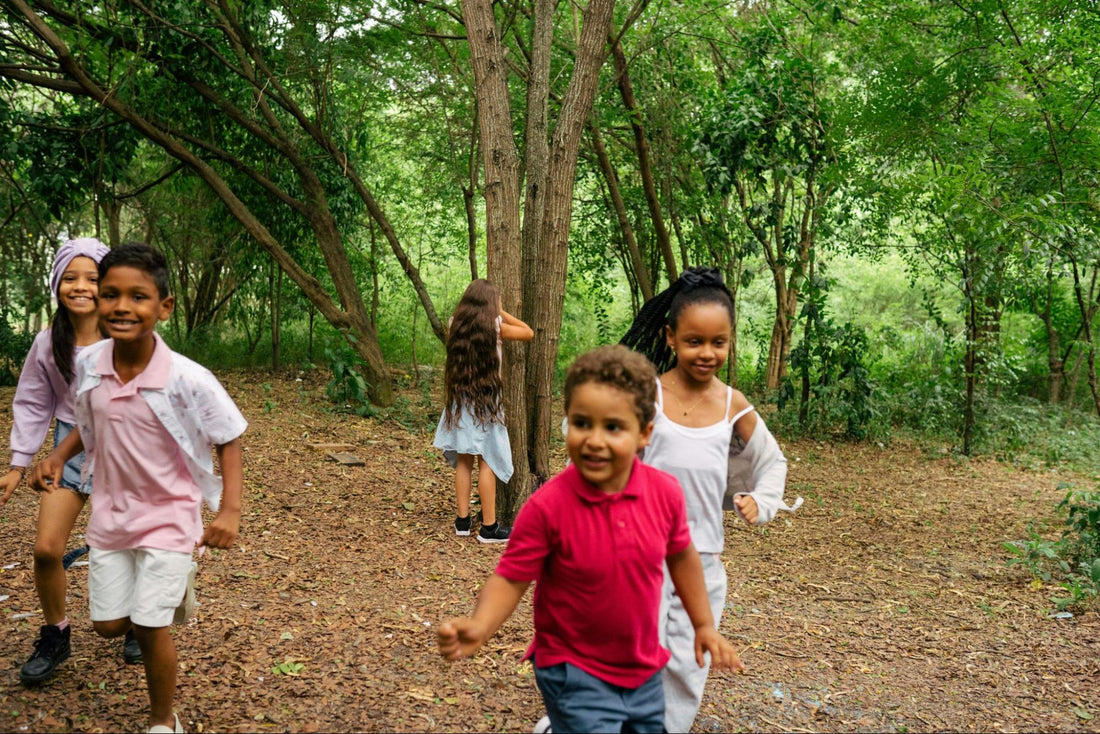Exercise is important for keeping kids healthy and happy. It helps build strong muscles, keeps bones healthy, and lowers the risk of diseases like type 2 diabetes. Physical activity also boosts attention, memory, and mood. Whether it’s running around at recess or playing sports, staying active is key to a child’s growth.
Outdoor play is a great way for kids to get moving and have fun. By creating a safe and inviting space for them to play, you can encourage healthy habits while also keeping your yard looking nice. Whether climbing, swinging, or just relaxing, active play supports their physical and emotional development.
Essential Benefits of Exercise for Children
Exercise is vital for children, impacting their physical health, cognitive abilities, and emotional well-being. Encouraging regular activity can foster healthier and happier lifestyles.
Physical Health Improvement
Regular exercise plays a significant role in enhancing children's physical health. Engaging in physical activities helps strengthen muscles and bones, contributing to healthy growth patterns. Activities like running, jumping, or playing sports increase cardiovascular fitness, which is essential for maintaining heart and lung health.
Physical activity can help maintain a healthy weight, reducing the risk of obesity. It also boosts immune function, enabling children to fight off common illnesses more effectively.
Cognitive Development Enhancement
Exercise has a profound impact on cognitive development in children. It improves brain function, supporting better thinking and learning abilities. Engaging in regular physical activity can enhance concentration and attention span, leading to improved academic performance.
Exercise stimulates brain growth by increasing blood flow and stimulating the production of important growth factors. These benefits are particularly significant in children aged 6 to 13, where cognitive development is crucial.
Emotional Well-Being Support
Exercise is a powerful tool for supporting emotional health in children. Activities that involve physical movement can reduce stress and anxiety, promoting a more positive mood. Exercise increases the production of endorphins, chemicals in the brain that act as natural mood lifters.
Regular participation in physical activities helps children build better self-esteem and resilience. Engaging with products like our Play System provides a fun and inviting environment that can help children feel more confident and capable, both physically and emotionally.
Exercise and Growth
Regular exercise is crucial for children's development, supporting muscle and bone strength and ensuring healthy growth patterns. Engaging in physical activities can greatly benefit children in multiple ways.
Bonding with Muscle and Bone Development
When your child participates in physical activity, their muscles and bones become stronger. Activities like running or jumping promote bone density and muscle tone. This is essential for preventing injuries and ensuring overall strength and endurance.
Promotion of Healthy Growth Patterns
Exercise helps regulate a child's weight and supports cardiovascular health. It ensures that your child's body functions properly as they grow, reducing risks of health issues later in life. Activities that increase heart rate are particularly beneficial.
Psychological Advantages
Physical activity offers significant psychological benefits for children. Engaging in exercise can enhance self-esteem and confidence while also helping manage stress levels effectively.
Boosting Self-Esteem and Confidence
Exercise is crucial in helping children build self-esteem and confidence. Participating in physical activities allows them to achieve new skills and improve existing ones. This sense of accomplishment fosters positive self-image.
Through teamwork or solo achievements, children learn to value their abilities. Success in these activities often translates into a more positive outlook on other life challenges.
Stress Reduction and Management
Exercise is an effective way for children to manage and reduce stress. Activities that raise the heart rate can trigger endorphin release, improving mood and decreasing anxiety. This release can help children feel more relaxed and manage everyday stresses better.
Regular physical activity provides an outlet for energy and tension. Engaging in physical play, such as climbing or swinging, can be particularly beneficial. Our play system setup encourages kids to experiment with various activities in a safe yet stimulating environment. It can act as a therapeutic tool, helping children cope with pressures from school or social dynamics by providing a fun and engaging way to unwind.
Social Skills Through Physical Activity
Engaging your child in physical activities can significantly boost their social skills.
Cooperative Play and Sportsmanship
Cooperative play involves working with others towards a shared goal, like a team sports event or a group task. Children learn the importance of rules, taking turns, and respecting teammates' roles. This experience teaches fairness and patience, crucial elements of sportsmanship.
Playing on structures like ours encourages cooperative play. When children help set up or build with friends, they naturally learn to communicate effectively and resolve conflicts. The hands-on experience fosters a spirit of camaraderie while making the play environment unique with your sourced materials.
Effective Communication and Teamwork
Communication is key when children engage in group exercises. Through teamwork, they learn to express ideas, listen to others, and follow instructions. These skills are invaluable both on the playground and beyond.
Long-Term Lifestyle Habits
Integrating physical activity into children's daily routines can create lifelong habits. Encouraging these habits not only helps with current health but also establishes foundations for a healthy future.
Instilling a Love for Physical Activity
Fostering a positive relationship with exercise starts at an early age. You can do this by integrating fun activities that capture your child's interest. Think about what makes them excited—perhaps it's riding a bike, swimming, or playing sports. The goal is to make exercise feel like play, not a chore. Introducing diverse activities can prevent boredom and promote enthusiasm for physical activity.
Preventing Future Health Issues
Regular physical activity during childhood plays a key role in preventing future health problems. Engaging your child in consistent exercise can lower risks of obesity, diabetes, and heart disease. This sets a foundation for a healthier life, reducing the likelihood of these conditions persisting into adulthood.
Being proactive about your child's health today can benefit them long-term. Encourage daily movement, whether through sports teams or outdoor adventures.
Strategies for Encouraging Exercise
Encouraging children to stay active involves the support of parents and the availability of engaging programs. Both home and community environments play crucial roles in making exercise fun and regular.
Role of Parents and Guardians
Parents influence their children's activity levels significantly. You can lead by example, showing how regular exercise is part of a healthy lifestyle. Encourage activities that suit your child's interests, ensuring they view exercise as fun.
You can also involve them in daily tasks that require movement, like taking a walk after dinner or playing catch in the backyard.
School Programs and Community Sports
Schools and communities offer vital opportunities for children to stay active. Join local sports teams or clubs that match your child's interests. These activities help develop social skills alongside physical fitness.
Participating in school clubs and sports can make exercise a regular and enjoyable routine. Look for programs that emphasize fun and teamwork, which encourages ongoing participation.
Communities often have accessible facilities, such as gyms or parks, where children can try different exercises. Socializing with peers during these activities makes exercise a positive experience.
Encourage your child to engage in different types of physical activities regularly, which keeps them enthusiastic about staying active.
Age-Appropriate Exercise Recommendations
Children need different kinds of activities as they grow. Younger kids thrive with play, while older children benefit from more structured exercises.
Play for Young Children
For children aged 3 to 5 years, engaging in play throughout the day is crucial. This helps them build basic movement skills and develop social skills. Activities like running, jumping, and climbing are ideal.
Structured Activities for Older Children
Older children, especially those aged 6 to 17 years, benefit from structured physical activities. Aim for at least 60 minutes of moderate to vigorous exercise daily.
This should include a mix of aerobic activities like biking or swimming, muscle-strengthening exercises like push-ups, and bone-strengthening activities like jumping rope.
Challenges and Considerations
When encouraging children to exercise, it’s important to address both safety and accessibility. Children need a safe environment to play and grow physically. Additionally, overcoming obstacles to regular physical activity ensures they stay active and healthy.
Encouraging Healthy Play: The Key to Your Child's Growth and Well-Being
Encouraging children to exercise is essential for their overall health and development. It helps them build strong muscles, improve their mood, and boost their cognitive abilities.
By creating a safe and enjoyable environment for exercise, you can instill healthy habits that will benefit them for a lifetime. From promoting physical health to enhancing social skills and emotional well-being, regular activity is key to helping children thrive.
Let’s make sure our kids have plenty of opportunities to move, play, and grow into happy, healthy individuals.

